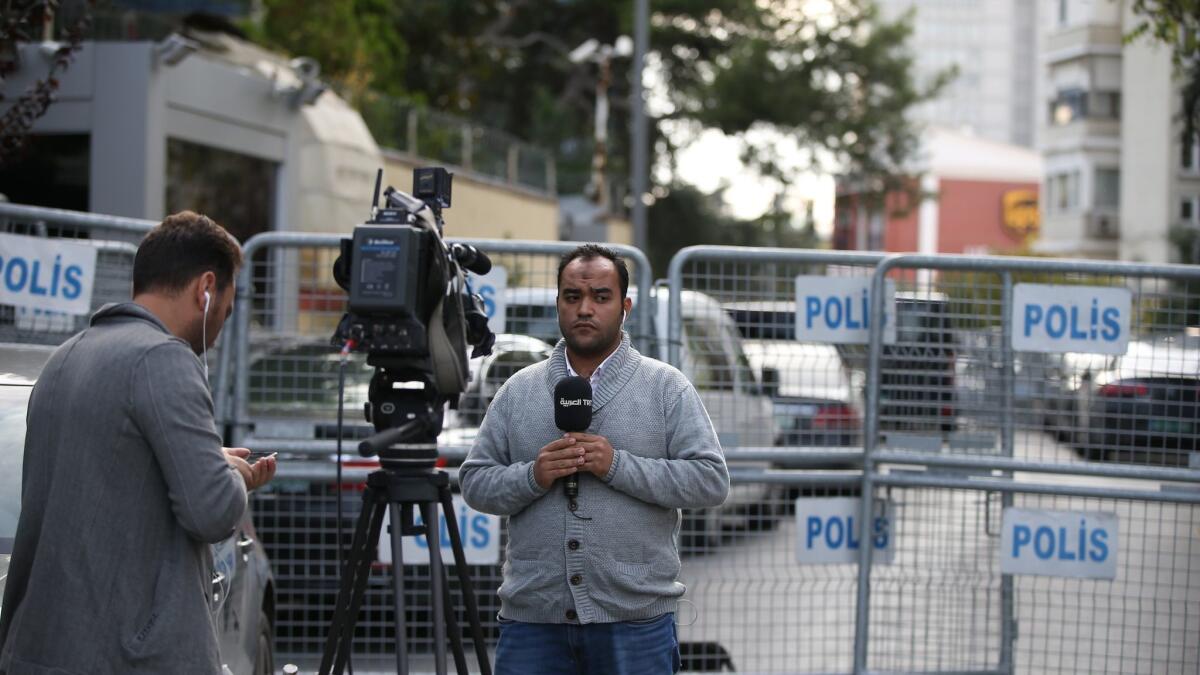Saudi Arabia denies holding prominent journalist and critic, last seen in its consulate in Turkey

The disappearance of a prominent Saudi journalist last seen entering his country’s consulate in Istanbul is being cast by human rights advocates as an attempt by Saudi Arabian leaders to repress dissent.
Jamal Khashoggi, a 59-year-old veteran reporter and commentator who has been critical of the Saudi monarchy, went to the consulate Tuesday to obtain a document certifying his divorce ahead of his pending marriage to his Turkish fiancee.
He never came out, said his fiancee, who had waited outside the consulate, keeping his mobile phone for safekeeping.
Khadija Jankeez, a friend of the Khashoggi, went to the consulate later that day after hearing he had disappeared and waited for hours with the fiancee.
Consulate workers “told us he had left,” she said.
That was the official line of the Saudi government. The consulate said Wednesday it was working with Turkish authorities to investigate “the disappearance of Jamal Khashoggi after he left the consulate building.”
But a spokesman for Turkey’s president said that Khashoggi was still at the consulate and that the government had “no information revealing the contrary,” according to the Turkish media outlet Hurriyet Daily News.
And Turan Kislakci, head of the Turk-Arab Media Assn., said in a phone interview Thursday that police told him they had photographic evidence of Khashoggi entering the consulate but not leaving it.
He also said that Khashoggi, whom he described as a close friend, had visited the consulate last Friday and was instructed to return on Tuesday.
On Thursday, Turkey’s government summoned the Saudi Arabian ambassador to the Foreign Ministry to discuss the situation. The outcome of that meeting was unclear.
“We don’t have any information about him. We are probing it,” the ambassador, Walid bin Abdulkarim al-Khuraiji, told the Hurriyet Daily News after leaving the ministry.
Khashoggi had once been close to the monarchy, even serving as an advisor to onetime Saudi intelligence chief Turki bin Faisal.
But he later turned critical of King Salman and his son Crown Prince Mohammad bin Salman for their intolerance of dissent. Last September, Khashoggi went into self-imposed exile in the United States after a government crackdown netted dozens of people, some of them his friends, as the crown prince moved to consolidate his power.
“It was painful for me several years ago when several friends were arrested,” he wrote in a Washington Post opinion article explaining his decision. “I said nothing. I didn’t want to lose my job or my freedom. I worried about my family.
“I have made a different choice now. I have left my home, my family and my job, and I am raising my voice. To do otherwise would betray those who languish in prison.”
He wrote that the government now saw him as an “enemy” and did not hesitate to use “fear, intimidation, arrests and public shaming” against those “who dare speak their minds.”
Mohammad bin Salman has led a PR-friendly drive aimed at weaning the country off its reliance on oil and diversifying its economy. In the last year, the crown prince has won praise by granting freedoms long absent in Saudi Arabia, including reestablishing cinemas and allowing women to drive.
But there has been no such opening politically, as activists, clerics and civil society leaders have been imprisoned even for mild criticism of the government.
Sarah Leah Whitson, Middle East director at Human Rights Watch, said in a statement Thursday that if in fact Saudi authorities detained Khashoggi, “it would be yet another escalation of Crown Prince Mohammad bin Salman’s reign of repression against peaceful dissidents and critics.”
“The burden of proof is on Saudi Arabia to produce evidence for its claim that Khashoggi left the consulate alone, and that Saudi agents have not detained him,” she said.
Galip Dalay, research director at the Istanbul-based Al Sharq Forum and a nonresident fellow at the Brookings Institute in Doha, Qatar, said kidnapping Khashoggi on foreign soil would constitute “a breach of sovereignty.”
He said it would also add friction to the relationship between Turkey and Saudi Arabia.
“If this is the case, any Arab nationals living in Turkey — and there are a significant number, including intellectuals, dissidents and businessmen — they are not safe here,” he said.
Relations between the two countries have been strained over Turkey’s support of Qatar, which has been the target of an isolation campaign by its Persian Gulf neighbors, led by Saudi Arabia and the United Arab Emirates.
Special Correspondent Farooq reported from Istanbul. Staff writer Bulos reported from Amman.
Twitter: @nabihbulos
More to Read
Sign up for Essential California
The most important California stories and recommendations in your inbox every morning.
You may occasionally receive promotional content from the Los Angeles Times.










